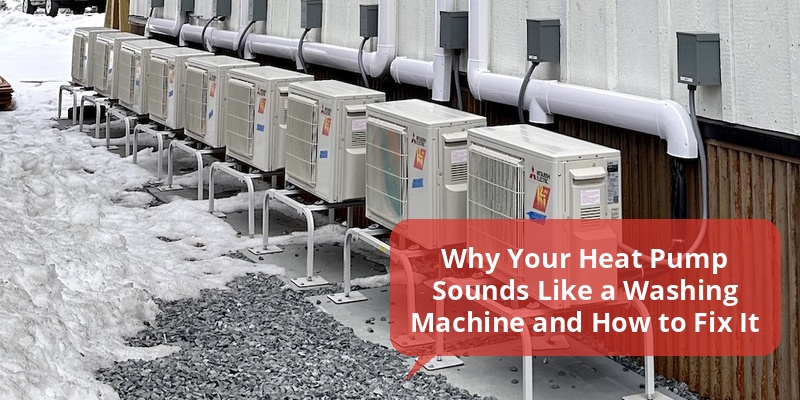Many homeowners notice their heat pump making noises similar to a washing machine, which can be both confusing and concerning. This common issue often arises due to mechanical or installation factors that cause vibrations and rattling sounds. Understanding why a heat pump emits these sounds and knowing effective solutions can help maintain system efficiency and ensure a quiet indoor environment.
| Possible Cause | Description | Recommended Action |
|---|---|---|
| Loose or Misaligned Fan Blades | Fan blades hitting internal components create a repetitive noise resembling a washing machine spin cycle. | Inspect and tighten or realign fan blades to stop the noise. |
| Compressor Vibrations | Vibrations from the compressor motor can cause rattling and humming sounds. | Check compressor mounting and install vibration isolation pads. |
| Loose Panels or Mountings | Panels or fasteners that are not secure cause rattling noises during operation. | Tighten panels and fasteners to reduce rattling. |
| Debris or Foreign Objects | Items stuck in the unit fan or casing generate irregular noises, similar to spinning loads in a washer. | Remove debris and clean the unit regularly. |
| Faulty Bearings or Motors | Worn bearings or motors create a repetitive sound as parts wear down. | Schedule professional maintenance or motor replacement. |
Common Reasons Heat Pumps Produce Washing Machine-Like Sounds
Heat pumps are engineered to run quietly, but mechanical issues or external factors may lead to unexpected noises. The most frequent reason for the “washing machine sound” is vibration created inside the outdoor unit affecting internal components.
Loose components, particularly fan blades or compressor parts, vibrate and produce rhythmic sounds comparable to a washing machine’s spinning action. Additionally, environmental conditions such as uneven installation surfaces can intensify these noises.
Fan Blade Issues Causing Rhythmic Noises
The outdoor unit fan blades spin at high speed, and if they become loose, bent, or misaligned, they may hit other parts inside. This contact results in a persistent clicking or spinning noise often mistaken for a washing machine.
Regular inspection and adjustment of fan blades can prevent this issue. In some cases, replacement of damaged blades is necessary.
Compressor Vibrations and Mounting Problems
The compressor is the heart of the heat pump and can generate vibrations, especially if its mounting brackets have loosened. These vibrations transmit through the unit’s frame, creating a rattling or humming sound resembling a washing machine cycle.
Adding vibration isolation pads and securing the compressor can significantly reduce these noises.
How Installation and Environment Affect Heat Pump Noise Levels
Improper installation is a significant contributor to heat pumps sounding like washing machines. Placing the unit on an uneven surface or directly on a deck or wall can amplify vibrations.
Nearby loose panels or loose screws can cause rattling noises synced with the pump’s operation.
Installation Surface and Support
Heat pumps should be installed on a flat, stable, and vibration-absorbing surface. Concrete slabs with rubber pads or specially designed mounting brackets are ideal.
Securing Panels and Fasteners
Loose cabinet panels cause persistent rattling sounds. Regular maintenance to inspect and tighten all fasteners is crucial to minimizing noise.
Other Mechanical Reasons Heat Pumps Can Sound Like A Washing Machine
Beyond fan and compressor issues, several internal mechanical problems can mimic washing machine noises.
- Worn Bearings: Bearings inside motors and fans wear down and cause repetitive thumping noises.
- Debris Inside Unit: Leaves, sticks, or other foreign objects caught in the fan blades create irregular noises during operation.
- Blower Motor Problems: Faulty blower motors may develop repetitive hums and vibrations, especially when on the verge of failure.
How To Diagnose The Source Of The Noise
A systematic diagnosis approach can help identify why a heat pump sounds like a washing machine:
- Listen closely to pinpoint whether noise originates inside the outdoor unit or from nearby supports.
- Check the fan blades by visual inspection; gently spin the fan to feel for resistance or rubbing.
- Inspect the compressor for loose mounts or visible vibration points.
- Ensure the heat pump is installed on a level surface free of debris.
- Tighten all accessible panels and screws.
Effective Solutions To Stop Your Heat Pump From Making Washing Machine Sounds
Once the source is identified, apply these fixes to reduce or eliminate the noise:
Realign Or Replace Fan Blades
If fan blades are loose or damaged, tighten bolts or replace blades to restore smooth operation.
Install Vibration Isolation Materials
Using rubber pads, neoprene mounts, or foam insulation can absorb compressor vibrations and reduce sound transmission.
Secure Panels And Screws Firmly
Regularly check and tighten all panels, screws, and fasteners to stop rattling sounds.
Clear Debris Promptly
Remove leaves, sticks, or dirt build-up inside and around the unit. Clean fan blades and vents to avoid noise caused by obstruction.
Request Professional Maintenance
For persistent noises related to motor or bearing wear, schedule a licensed HVAC technician to inspect and replace faulty parts.
Prevention Tips To Avoid Washing Machine-Like Sounds From Heat Pumps
To maintain a quiet heat pump and prevent future issues, consider these best practices:
- Schedule routine professional inspections and maintenance.
- Keep the unit clean and free from debris year-round.
- Ensure installation is performed on a proper vibration-absorbing and level surface.
- Check and tighten fasteners after severe weather or seasonal changes.
- Replace worn components early before noises become disruptive.
When To Call An HVAC Professional
If troubleshooting steps do not resolve the washing machine-like sounds, or if the noise is associated with reduced heat pump efficiency, it is advisable to seek professional expertise. Experienced technicians can:
- Perform detailed diagnostics using specialized tools.
- Repair or replace compressors, motors, or internal components safely.
- Verify proper installation and improve vibration control measures.
Ignoring persistent noise might lead to mechanical failure and costly repairs later, so timely intervention is key.
